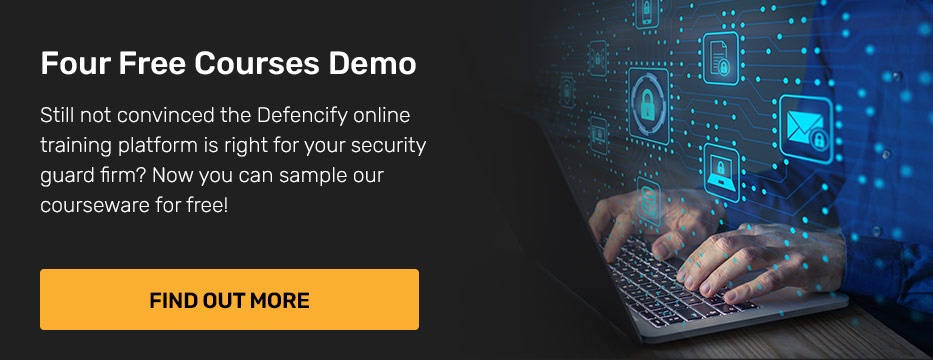Sooner or later, every contract security firm gets audited for compliance. It may be the result of a security-related incident involving your staff, or it may just be luck of the draw. In this article we discuss what investigators might be looking for, what happens when violations are found, and the possible outcomes of non-compliance.
Defining Contract Security Guard Firms Compliance
Most states have a licensing bureau, division, or agency that is charged with making sure private contract security firms adhere to rules and standards set forth by the state. The aim of a security audit is to ensure the professionality of guard services and to be able to identify the proper liable parties in a security-related incident on behalf of consuming businesses.
In the business office, investigators will want to see that your firm maintains proper personnel records including licenses, certificates of education, and clean background checks for every employee and instructor. They will want proof your firm has sufficient liability insurance, and they will check to ensure your security guard training program meets the minimum state requirements for the number of classroom hours and subjects presented. If there was a security-related event at a work site or an instructor’s license recently expired, for example, the investigator will want to see that your firm did its due diligence and notified the state of the incident or change in employee status. If any of these boxes aren’t checked, that’s a violation.
In the field, inspectors will make unannounced visits to the guard booth at the entrance to a gated community, drop by the security desk in the corporate headquarters lobby, pop in on the overnight guard standing watch at the auto dealership or construction site, or stop a vehicle patrolling a mall parking lot. If the officer on duty is not carrying their license, that’s a violation. If they are out of uniform while on shift or driving an improperly marked or unmarked vehicle, for example, those are violations too. For a more detailed list of violations, see our article on state statute violation examples.
The Non-Compliance Cost
When violations are found the inspector can issue a citation resulting in fines and other penalties, the amount and severity of which varies by state. Repeat offenders may see their Guard Cards suspended or revoked, and in the most extreme cases, your firm’s license to operate can be pulled, effectively shutting down your business.
Each state licensing agency prepares its own fine schedule. This chart shows the basic violation information and fine amounts for the ten states in which Defencify is currently certified to provide remote self-paced security officer training.
| State |
Fine or Penalty |
|
|
| Arizona |
Class 1 misdemeanor |
|
|
| California |
$5,000 maximum fine per occurrence |
|
|
| Colorado |
Not less than $50 and no more than $5,000 per violation |
|
|
| Delaware |
Misdemeanor plus fine up to $10,000 |
|
|
| Georgia |
$5,000 per occurrence |
|
|
| Illinois |
1st Offense $ 500.00
2nd Offense $ 500.00
3rd Offense $ 500.00 |
|
|
| |
|
| |
|
| Minnesota |
Revoke, suspend, refuse to issue or reissue license |
|
|
| Tennessee |
Up to $2,000 fine per occurrence |
|
|
| Texas |
$5,000 maximum fine per occurrence |
|
|
| Utah |
1st Offense $ 800.00
2nd Offense $1,600.00
3rd Offense $3,200.00 |
|
|
Defencify Helps Keep Money in Your Pockets
In addition to offering a wide range of affordable state-certified online training courses for new hires to earn their Guard Cards, part of the value of the Defencify platform is our cloud-based records portal. This centralized database securely stores all critical employee records for audit and compliance purposes.
All employee profiles—past and present—are stored in the cloud by Defencify indefinitely and at no cost; the service is included in the monthly subscription fee. HR personnel and supervisors can instantly access the training records, certification, and compliance status of every employee on staff. Be alerted to when guards are up for license renewal and what courses are required for recertification.
The Defencify platform tracks these and other metrics to ensure your guards are always in compliance with state licensing and education requirements, insulating you from the threat of fines resulting from simple administrative oversights. When (not if) your firm is audited you’ll be able to easily prove to investigators your workforce is compliant.
Visit us at www.defencifytraining.com and download our free whitepaper to learn more about how the Defencify platform and cloud-based records portal can help you prepare for your next security audit and spend your resources building your business, not paying fines.

